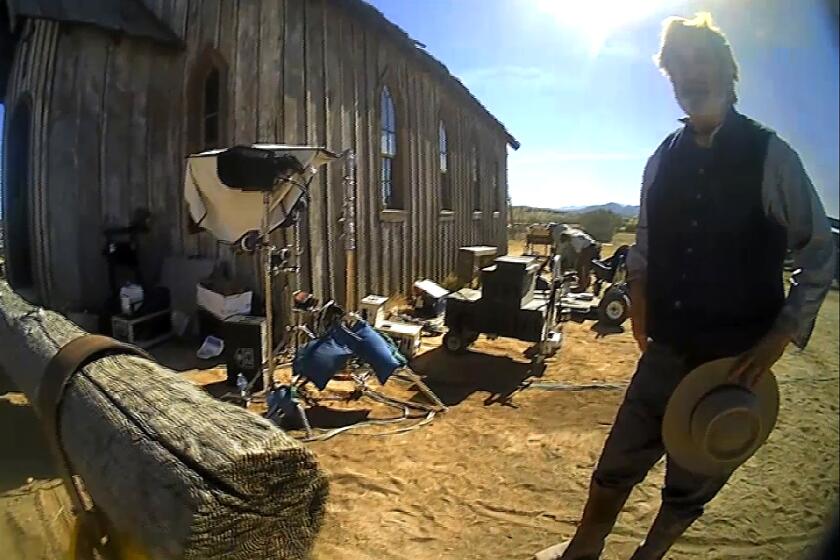Review: ‘Slay the Dragon’ examines gerrymandering’s threat to democracy
Any documentary that opens with “There never was a democracy yet that did not commit suicide,” an 1814 quote by John Adams, probably has a few lids to blow off. And that’s what directors Barak Goodman and Chris Durrance do with smarts, energy and integrity in “Slay the Dragon,” a compelling and instructive look at the political practice of gerrymandering. It’s also an infuriating watch on several levels, which is entirely the point of this call-to-action portrait.
To the uninitiated, gerrymandering, named in part after Massachusetts governor (and later James Madison’s vice president) Elbridge Gerry, who signed a self-serving redistricting bill for his state in 1812, is the process by which U.S. voting districts are shrewdly drawn to shield politicians from public opinion and help guarantee election results. It’s a system that essentially finds legislators picking voters instead of voters choosing legislators. One observer here dubs the procedure “an astonishing manipulation of democracy.”
Using a variety of cogent examples from several states, the film clearly and comprehensively proposes how, over the last 10 years, the steroidization of gerrymandering has helped lead to our nation’s extreme political divide and enabled one political party to focus solely on preserving its base.
One of the most visible and tragic consequences of partisan gerrymandering was the Flint water crisis. As explained here, in 2013, protected Republican politicians overrode the will of Michigan voters and installed dictatorial emergency district managers across the state. One of these unelected officials then made the ill-conceived, cost-cutting decision to switch the source of Flint’s drinking water from the Detroit water system to the corrosive Flint River. The result was contamination, illness and death — and problems still remain.
The filmmakers then follow the effects of REDMAP, a national plan launched in census year 2010 by the Republican State Leadership Committee and organized by savvy Republican strategist Chris Jankowski in the wake of Barack Obama’s presidential win. The goal: to gain control of redistricting maps, neutralize demographic shifts and reclaim party dominance, particularly in such swing states as Ohio, North Carolina and Wisconsin.
Aided by donations from Walmart, the tobacco industry, the Koch brothers and others, the $30-million initiative (a bargain given its eventual success) used high-tech mapping and data tools and the manipulative line-drawing practice called “packing and cracking” to ensure electoral firewalls. In 2012, Republicans won majorities or supermajorities in more than 20 statehouses.
It should be noted that Democrats have also benefited from gerrymandering, but, as the movie posits, never at such unbridled, micromanaged and calculated levels.
The film also burrows into two recent, high-profile anti-gerrymandering campaigns. The first was inspired by Michigan’s Katie Fahey, an ebullient political neophyte in her late 20s who founded Voters Not Politicians in 2017. It mushroomed into a major grassroots movement that led to the creation and passage of Proposal 2, which established an independent redistricting commission for the state.
Then there was the set of attorneys, including married co-counselors Ruth Greenwood and Nick Stephanopoulos, who represented Wisconsin Democrats in a suit against their state’s 2011 redistricting plan. The case went from Wisconsin’s federal court to the U.S. Supreme Court, which, in 2019, ruled that partisan gerrymandering was beyond its scope. (Newest justice Brett Kavanaugh was the deciding vote in the 5-4 decision.)
Goodman and Durrance capture a wealth of you-are-there moments and build plenty of tension as these two deeply committed operations navigate their share of local, political and legal challenges.
A solid use of archival clips, graphics and charts plus insightful chats with a host of academics, journalists, legal minds, current and ex-politicos, and such GOP gerrymandering “stars” as Jankowski and Robert LaBrant (late redistricting wizard Tom Hofeller is also featured), complement this entertaining exposé.
The film aptly arrives against the rollout of the 2020 Census, which will affect this year’s redrawing of district lines. As they say, forewarned is forearmed.
‘Slay the Dragon’
Rated: PG-13, for brief strong language.
Running time: 1 hour, 44 minutes.
Playing: Available April 3 on VOD
More to Read
Only good movies
Get the Indie Focus newsletter, Mark Olsen's weekly guide to the world of cinema.
You may occasionally receive promotional content from the Los Angeles Times.






